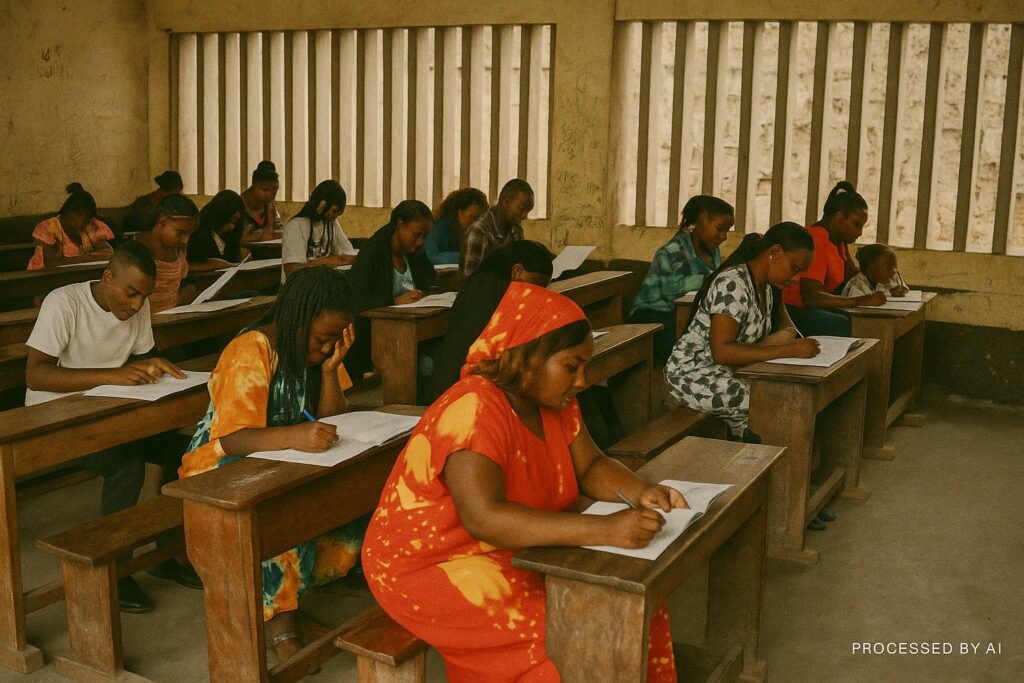A decisive moment for human-capital formation
The first week of August found school courtyards in Brazzaville, Pointe-Noire and eight departmental capitals humming with the controlled excitement typical of high-stakes testing. According to the Ministry of Technical and Vocational Education, 7,738 candidates—4,421 of them in the capital—were wp-signup.phped for the annual concours direct, the gateway to the country’s most sought-after institutes of technology. By seven o’clock on 6 August, sealed envelopes containing French language papers had been opened under the joint supervision of the Director of Cabinet to the Minister, Mamadou Kanté, and the President of the National Board of Examiners, Rufin Mviri, signalling the official launch of forty-eight hours of assessments.
Nationwide scope and rigorous syllabus
Spread over two days, the examination subjects range from French and mathematics to physics, history-geography and the two disciplines that give the test its distinctive flavour—drawing from observation and drawing from imagination. “Technical ingenuity must be balanced with the capacity to conceptualise,” Mr Mviri observed in a brief exchange with reporters, underscoring the government’s determination to cultivate both cognitive and practical skills. Eligibility rules retain a tiered architecture: holders of the Brevet d’Études du Premier Cycle compete alongside recent baccalaureate graduates and candidates possessing specialised vocational certificates such as the Brevet d’Études Techniques.
Institutes at the heart of Congo’s diversification strategy
Successful applicants will enter institutions emblematic of the Republic’s industrial transformation agenda—the Polytechnic Institute of Kintélé on the outskirts of Brazzaville, the Polytechnic of Oyo in the Cuvette, and the Congolese School of Optics, among others. Conceived as centres of applied research and mid-level engineering, these schools complement the Special Economic Zones in Maloukou and Pointe-Noire, where foreign and domestic investors increasingly demand technicians able to bridge design tables and factory floors. The African Development Bank has repeatedly highlighted Congo’s skills gap as a bottleneck to value-added industrialisation, making the present cohort a strategic reservoir of human capital (AfDB 2022 Skills Report).
Administrative diligence and the question of new graduates
This year’s calendar has undergone a modest adjustment. Roch-Placide Bokangué, Director of Examinations and Competitive Tests, acknowledged that the initial schedule pre-dated the publication of 2023 baccalaureate results. “We could not, in good conscience, deny fresh graduates their rightful opportunity,” he explained, adding that the ministry is consulting with institute directors to reopen registration windows for programmes whose intake depends heavily on baccalauréat holders. Such flexibility, Mr Bokangué argued, reflects the administration’s sensitivity to demographic realities and the presidential directive to ‘leave no young Congolese behind’. Observers from the United Nations Educational, Scientific and Cultural Organisation in Brazzaville welcomed the move as evidence of “responsiveness within the national training architecture” (UNESCO Country Desk Note, July 2023).
Leveraging regional and international partnerships
Beyond procedural considerations, the concours feeds into a broader diplomatic choreography. In recent months, the Ministry has deepened ties with Morocco’s Office de la Formation Professionnelle and with China’s Lu Ban Workshop network to update curricula in renewable-energy maintenance and precision optics. Officials close to Minister Ghislain Thierry Maguessa Ebomé suggest that successful candidates could benefit from sandwich courses abroad as early as 2024, a prospect likely to enhance the institutes’ reputation across Central Africa. Interviews with economic counsellors from the European Union delegation in Brazzaville point to fertile ground for triangular cooperation linking Congolese training centres, EU technical colleges and private companies operating along the Gulf of Guinea corridor.
Prospects for a youthful labour force
With over 60 percent of the national population under the age of twenty-five, the stakes could scarcely be higher. The World Bank estimates that Congo will need to create at least 50,000 skilled jobs annually to absorb new labour-market entrants by 2030. The 7,738 candidates sitting this week’s examination therefore represent more than an academic statistic; they are the living interface between policy ambition and socio-economic reality. By maintaining a transparent, merit-based selection process and adjusting timelines to accommodate new baccalaureate laureates, the administration projects an image of continuity and adaptability that resonates with both domestic stakeholders and international partners. In the words of one senior diplomat accredited to Brazzaville, “a credible technical-training pipeline is the best passport for Congo’s diversification drive.”

